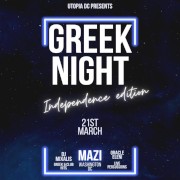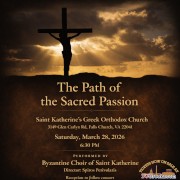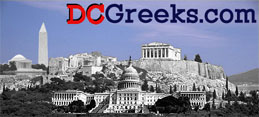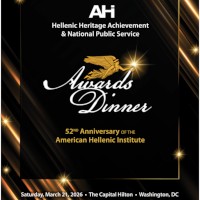May 29, 2002
Washingtonian
Magazine Tackles Greek Life in DC
Major DC
publication presents view of Greek Community's storied past in the DC area and
its struggles to preserve the culture for the future.
We got an email from a non-Greek friend the other day telling us to check out article on Greek life in this month's issue of Washingtonian. We spent the $2.95 and were fairly pleased to find 14 pages of text and pictures on why "It's Good to Be Greek" in DC. The article focuses on the history of the Greek community in Washington, DC -- a history that even life-long residents may not have fully appreciated -- but also discusses the quest to preserve the Greek culture in this area.
This article isn't about the young Greek community that most of us are most familiar with in this area. Instead, the author takes us on a journey into past century of Greek life in DC, regaling the accomplishments of the Greek immigrants in this area, in such arenas as local business, but also in their volunteer and other charitable efforts in the greater DC community as a whole. While it was nice to read about the accomplishments of that generation, both in and out of the Greek community, it was a little disheartening to read that these accomplishments came with a price of losing part of their Greek-American identity. There are several examples in the article of Greeks in the area taking the focus on assimilation into American society too far, to the point of wanting to change or disguise their names so they didn't sound Greek anymore. Although the article only briefly alludes to it, racism against Greeks had much to do with this practice of Americanizing one's name in order to succeed in business and other aspects of life here in DC. Back then, the emphasis was almost too much on the "American" in "Greek-American," so in their quest to fit in, many Greek-Americans in the DC area distanced themselves from their heritage, sometimes too much. The irony is that while the author celebrates that generation of Greek-Americans for their contributions outside of the Greek community, she also reminisces on decades earlier when DC was much more "Greek" than it is now, especially among the youth.
This article, while generally a feel-good piece, didn't just sweep under the rug the Greek community's tendency to separate itself into even smaller factions. We were just surprised at the fact that this tendency actually led to the establishment of two churches inside the city. We had always wondered why there were two churches in DC, especially after seeing how small Sts. Constantine & Helen seemed when we'd go to festivals there. You just wouldn't think that politics from the old country could infect a community as small as the Greek community in DC, especially at that time. It's sad that this need for factionalism still exists today instead of a more Pan-Hellenic sentiment, especially in a smaller community of Greeks in the DC area.
We're not sure if this article accurately portrays the younger generation in DC. The article describes the younger generation as "almost fully Americanized." It really depends on where one observes young Greeks in this area. At an event like a Third Thursday or a YAL event, yes, most of the Greeks there are "almost fully Americanized." Yet if you judged this community by some of its Greek Nights, you'd think the article was wrong about the "Greekness" of the young community in DC. It's almost like there are two Greek communities in DC sometimes. It seems that there are very small number of young Greek-Americans in this community who are comfortable in both of these environments.
The "Greekness" of the young Greek community in DC can't obviously be judged, and shouldn't be judged, in the same way against a Baltimore, Chicago, New York, or any place else with a Greektown. There are a few quotes in this article that best describe the state of the Greek community in DC. St. Sophia's Fr. John explains, "Among the third and fourth generations, the sense of belonging to a Greek community is more theological and philosophical than national." St. George's Fr. Jim states that, "Aside from being Orthodox for me being Greek means having the Hellenic spirit, which is a way of thought, a spirit of exploration, the thirst for knowledge, and a sense of universal brotherhood." Marilyn Rouvelas, a convert to Greek Orthodoxy, perhaps puts it best when she says that, "Everyone can be Greek in their own way." Therefore according to these viewpoints, DC is as "Greek" as any of these other cities despite the fact that the Greeks in this area haven't held on to the language and some of the traditions as well as the Greeks of these other cities. We tend to agree that the Greek Community in DC, while smaller and not as defined as the Greek communities in other cities, is just as good.
Read
past feature articles.



